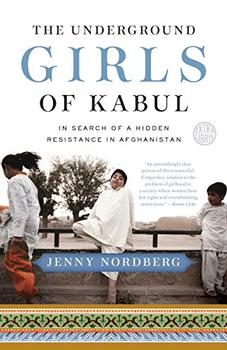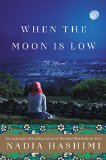Summary | Excerpt | Reading Guide | Discuss | Reviews | Beyond the book | Read-Alikes | Genres & Themes | Author Bio

In Search of a Hidden Resistance in Afghanistan
by Jenny NordbergAn investigative journalist uncovers a hidden custom that will transform your understanding of what it means to grow up as a girl.
An investigative journalist uncovers a hidden custom that will transform your understanding of what it means to grow up as a girl
In Afghanistan, a culture ruled almost entirely by men, the birth of a son is cause for celebration and the arrival of a daughter is often mourned as misfortune. A bacha posh (literally translated from Dari as "dressed up like a boy") is a third kind of child – a girl temporarily raised as a boy and presented as such to the outside world. Jenny Nordberg, the reporter who broke the story of this phenomenon for the New York Times, constructs a powerful and moving account of those secretly living on the other side of a deeply segregated society where women have almost no rights and little freedom.
The Underground Girls of Kabul is anchored by vivid characters who bring this remarkable story to life: Azita, a female parliamentarian who sees no other choice but to turn her fourth daughter Mehran into a boy; Zahra, the tomboy teenager who struggles with puberty and refuses her parents' attempts to turn her back into a girl; Shukria, now a married mother of three after living for twenty years as a man; and Nader, who prays with Shahed, the undercover female police officer, as they both remain in male disguise as adults.
At the heart of this emotional narrative is a new perspective on the extreme sacrifices of Afghan women and girls against the violent backdrop of America's longest war. Divided into four parts, the book follows those born as the unwanted sex in Afghanistan, but who live as the socially favored gender through childhood and puberty, only to later be forced into marriage and childbirth. The Underground Girls of Kabul charts their dramatic life cycles, while examining our own history and the parallels to subversive actions of people who live under oppression everywhere.
The Underground Girls of Kabul is quite entertaining and would be a good primer for anyone looking to know more about women's rights in Afghanistan. Those interested in the custom of bacha posh or simply keen on finding a good human interest story are sure to find the book to be a fascinating read. I especially recommended it as a book-group selection; with its discussion of gender roles and women's rights it will certainly generate good conversation...continued
Full Review
(1189 words)
This review is available to non-members for a limited time. For full access,
become a member today.
(Reviewed by Kim Kovacs).
The Underground Girls of Kabul explores the custom of bacha posh where girls are dressed as boys and pass off as sons in families. While, by definition, the bacha posh wear male clothing, I thought this would be a good opportunity to explore the various items of Muslim women's attire as I suspect that, like myself, many readers will be unclear about the differences between the various garments, such as the hijab, chador, abaya and burka:
 The practice of wearing a veil or head covering predates Islam; statues from approximately 2500 BCE depict veiled women, and the first written reference found is in an Assyrian legal text composed in the 13th century BCE. It's thought that the custom was common in Persia and Byzantine societies, ...
The practice of wearing a veil or head covering predates Islam; statues from approximately 2500 BCE depict veiled women, and the first written reference found is in an Assyrian legal text composed in the 13th century BCE. It's thought that the custom was common in Persia and Byzantine societies, ...
This "beyond the book" feature is available to non-members for a limited time. Join today for full access.

If you liked The Underground Girls of Kabul, try these:

by Nadia Hashimi
Published 2016
Mahmoud's passion for his wife Fereiba, a schoolteacher, is greater than any love she's ever known. But their happy, middle-class world—a life of education, work, and comfort—implodes when their country is engulfed in war, and the Taliban rises to power.

by Khaled Hosseini
Published 2014
Khaled Hosseini has written a new novel about how we love, how we take care of one another, and how the choices we make resonate through generations